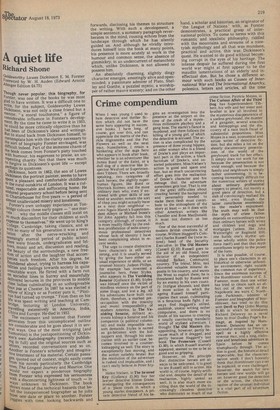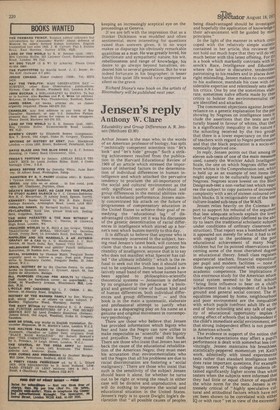A quiet life
Richard Shone
EC,roldsworthy Lowes Dickinson E. M. Forster ,,nrevvord by W. H. Auden (Edward Arnold tIbinger Edition £4.75) 'Though never popular, this biography, for rorster, was one of the books he was most glad to have written. It was a difficult one to wpr.ite, for the subject, Goldsworthy Lowes Ickinson, was not only a close friend but a mentor, " a moral touchstone," a figure of considerable influence in Forster's develop1,1ilent. By the time he came to write it in 1933, 't'e could be more critically objective than he been of Dickinson's ideas and writings. nut to stand back from Dickinson himself, to ,nnternplate him with the clarity necessary to ,1-11.e sort of biography Forster envisaged, was icult indeed. Part of the immense charm of 'le book comes from Forster's piety touched with humour, his eagerness to praise, an unrePenting charity. Not that there was much to forgive in Dickinson's quiet life — except Perhaps its quietness. bickinson, born in 1862, the son of Lowes ulokinson the portrait painter, seems to have Snent a pleasant and comfortable childhood In the rural outskirts of London. It was a cultUred, respectable and suffocating home. He endured preparatory school before being sent
Charterhouse for five years — a period of al Most unalleviated misery and loneliness.
Forster's own unhappy experience at Tonbridge colours these early pages — "one mar why the middle classes still insist on so much discomfort for their children at such ecxP,e, ose to themselves." He went up to King's °liege, Cambridge, taking classics, and as ;v_ith so
many of his generation it was a reve f e nerve-wracking and
■ !eroinglya teetr the period of public school. Pere were friends, undergraduates and felmusic and art, discussion and reading, cTo beauty of the surroundings, a new freet)rn of action and the laughter that accomPanies such freedom. After his degree, he rbdered about, trying to harness his capalilities and feelings towards society in quite oun u,nsuitable ways. He flirted with a farm run ,,un socialist lines in Surrey and mournfully Ilivered lectures in the provinces to middle class ladies culminating in an unforgiveable fr'"ovv Pas at Chester. In 1887 he was elected a of King's or as Forster puts it, " rilos had turned up trumps." From then on his t:feL,was spent writing and teaching at Camr`uge, lecturing at London University, c`ravelling extensively in America, India, hilla and Europe. He died in 1932. The excitement and interest that Forster generates from this uncomplicated outline considerable and he goes about it in sev,`Lcal ways. One of the most intriguing (and lnorous) is the juxtapositioning of Dickinsi"'s own Autobiography (recently publish,rig in full) and the original sources such as t_ett ems, recorded conversations and so on. .P',nother is Forster's scholarly and imagina P"ve treatment of his material. Certain passarom, es. quoted out of context might easily come his novels particularly the Cambridge es The Longest Journey and Maurice. One f‘s:sould not expect a ponderous biography w":3,rn Forster who expressed his seriousness ith a disconcerting lightness of touch — in waYs unknown to Dickinson. The book s,hows none of the technical hazards that belap the inexperienced biographer as he jolts Iireml one date or place to another. Forster Juggles with time, looking backwards and
forwards, disclosing his themes to structure the writing. With such a development, a simple sentence, a summary paragraph reverberates in the mind, rousing echoes from the landscape through which he has silently guided us. And although he vividly introduces himself into the book at many points, his presence is more acutely at work in the humour and common sense, the absence of gimmickry, in art undercurrent of melancholy which, unlike Dickinson, is not allowed to possess him. An absolutely charming, slightly dingy character emerges, amazingly alive and openminded; a passionate admirer of Plato, Shelley and Goethe, a puzzled mystic, a worshipper of rather mauve scenery; and on the other
hand, a scholar and historian, an originator of 'the League of Nations' with, as Forster demonstrates, a practical grasp of international politics. To come to terms with this romantic and idealistic philosophy, riddled with the mountains and streams of a ninetyish mythology and all that was mundane, practical and active, this was Dickinson's quest. He wanted to do good without becoming corrupt in the eyes of his heritage. The intense despair he suffered during the first world war might at first appear to be the maudlin lamentations of an elderly and ineffectual don. But he chose a different armour with such books as Causes of International War and The International Anarchy, polemics, letters and articles, all the time
keeping an increasingly sceptical eye on the proceedings at Geneva.
If we are left with the impression that as a thinker Dickinson was muddled and often sentimental, more interesting for questions raised than answers given, it in no ways makes us disparage his obviously remarkable quantities as a man. He was greatly loved, his affectionate and sympathetic nature, his wit, rebelliousness and range of knowledge, his desire to go always beyond banalities, endeared him to several generations. But he was indeed fortunate in his biographer; in lesser hands this quiet life would have appeared as silent as the grave.
Richard Shone's new book on the artists of Bloomsbury will be published next year.

































 Previous page
Previous page